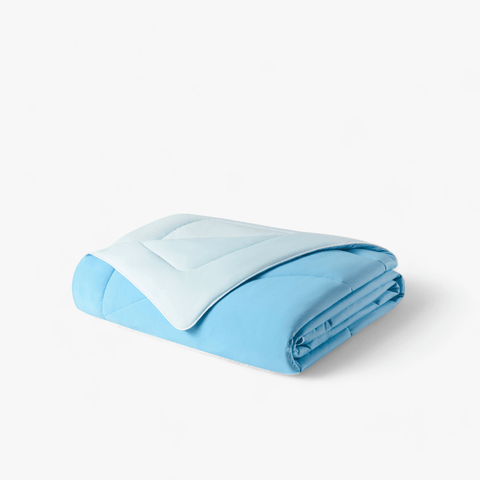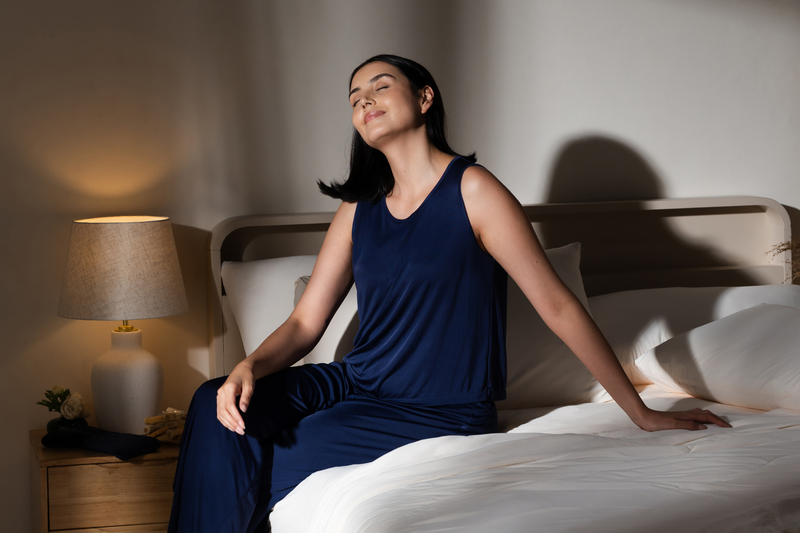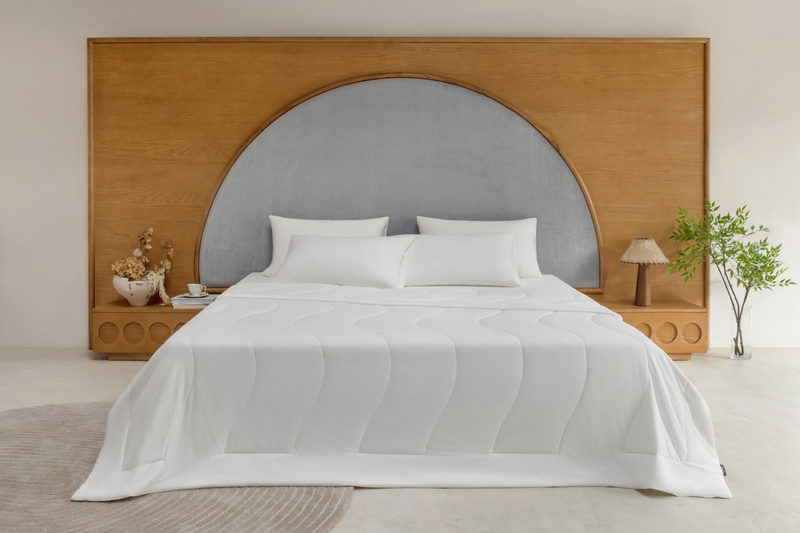Rest Away: Getting Better Sleep While Traveling
How to Sleep While Traveling: Expert Tips and Tricks for Rest
TL;DR:
Traveling, whether for business or pleasure, can significantly disrupt your sleep schedule. Changes to our sleep schedule and external factors such as a mode of transport or a new timezone can cause short-term sleep deprivation. We’ve rounded up all the commonly asked questions around sleep during travels and created a comprehensive guide to help you prioritize sleep, combat jet lag, and ensure restful nights no matter where you are.
Prioritizing Sleep While Traveling
How to Prioritize Your Sleep When You're Traveling
Maintaining a consistent sleep schedule is crucial when traveling. If you have a sleep routine such as reading before bed, bringing a book along may help you maintain consistency. As well, if it’s portable, packing comfort items such as your favorite sleepwear or bedding can be helpful to recreate a familiar sleeping environment. For hot sleepers, bringing a travel-friendly Kid’s Cooling Comforter may be essential as many accommodations and hotels do not offer cooling options.
How to Sleep the Night Before an Early Flight
To ensure a good night’s sleep before an early flight, go to bed earlier than usual and avoid caffeine or heavy meals late in the day. Create a packing checklist ahead of time and ensure you have packed all your essentials a couple of days prior to avoid last minute stresses or scrambling to replace items. For travelers who are worried about missing their flight, set multiple alarms and if possible, ask for a morning call from a friend or the hotel.
Combating Jet Lag
How Do You Sleep with Jet Lag?
Sync your sleep schedule with the local time at your destination as soon as possible. Create a comfortable sleeping environment and get plenty of natural sunlight during the day to help reset your body's internal clock.
How to Deal with Jet Lag Insomnia
Combat jet lag insomnia by staying hydrated, avoiding alcohol and caffeine, and if you're a hot sleeper, using cooling comforters and bedding to maintain a comfortable sleep temperature. Try to get on the local schedule as quickly as possible and practice good sleep hygiene.
Is Jet Lag Considered a Type of Insomnia?
Jet lag is not classified as insomnia but shares similar symptoms, such as difficulty falling and staying asleep. It is caused by disruptions to your circadian rhythm due to crossing multiple time zones.
How Do I Avoid Jet Lag if I Have to Travel Several Time Zones?
Adjust your sleep schedule gradually before your trip. On the plane, stay hydrated and try to sleep according to the destination's time zone. Recreate your sleep environment at your destination to help you fall asleep easier. Most hotels and accommodations have options for pillows intended to personalize your bed and ensure a more restful stay.
How to Stop Jet Lag While I'm Sick
When you're sick, managing jet lag becomes even more challenging. Stay hydrated, rest frequently, and create a comfortable sleeping environment. Gradually adjust your sleep schedule a few days before or after traveling. Certain medications may have side effects such as drowsiness, which can affect jet lag and should be carefully considered if taken.

Jet Lag Specifics
Do People Only Get Jet Lag Flying West to East?
Jet lag can occur in both directions, but it’s often worse when flying east due to the shortening of the natural day-night cycle.
How to Enjoy a Vacation Internationally if I Get Jet Lag Easily?
Plan for extra rest days at the beginning of your trip. Avoid jam-packed or stimulating itinerary at night to ensure you can wind-down properly. Consider bringing your own bed sheets or comforter if you're a hot sleeper to enhance sleep quality. Stay hydrated and avoid heavy meals close to bedtime.
Which Food is Considered Good to Overcome Jet Lag?
Foods rich in melatonin, such as cherries and walnuts can help regulate your sleep cycle. Light, nutritious meals and plenty of water are also beneficial.
Sleeping in Different Travel Situations
How to Sleep on a Plane When You're Nervous
If you're nervous about flying, try deep breathing exercises and listen to calming music. Bring a familiar blanket and use a sleep mask and earplugs to block out light and noise, creating a more conducive sleep environment.
What's the Best Way to Sleep on a Plane?
Create a comfortable environment with a cooling comforter, travel pillow, and sleep mask. Use earplugs or noise-canceling headphones to block out noise and stay hydrated throughout the flight.
What Can I Do to Force Myself to Sleep on Long Flights?
To sleep on long flights, wear comfortable clothing, use a travel pillow, and cover yourself with a cooling comforter. Earplugs or noise-canceling headphones and an eye mask can help block out distractions.
How to Sleep in a Car on a Road Trip
Create a comfortable sleeping environment, such as a travel pillow and blanket. Recline your seat if possible and use earplugs to block out noise. Take breaks to stretch and move around to prevent stiffness.
How Can I Learn to Sleep in the Bus?
Invest in a quality travel pillow and cooling comforter. Use earplugs and an eye mask to block out noise and light. Try to choose a window seat where you can lean against the side of the bus for added support and avoid being woken up by passengers.
Adapting to New Environments
Is It Common to Be Unable to Fall Asleep in a Hotel Room?
Yes, it’s common due to unfamiliar surroundings. Bring familiar items like your pillow or even your cooling comforters. Recreating your bedtime routine (such as reading or a portable white noise machine) during your hotel stay can feel more comfortable and familiar.
How to Balance Your Sleep When Traveling Internationally
Gradually adjust your sleep schedule before your trip. Upon arrival, spend time outdoors during daylight hours and consider cooling comforters to aid in restful sleep at night. Maintain regular sleep hygiene practices, such as a consistent bedtime routine. Avoid heavy meals and caffeine close to bedtime.
Can Traveling Make You Tired?
Yes, travel fatigue is common due to disruptions in routine, dehydration, and prolonged inactivity. Combat this by staying hydrated, taking short naps if needed, and maintaining a healthy diet.
Managing Sleep Disruptions
How Can I Fall Asleep and Stay Asleep for 8 Hours?
Maintain a consistent sleep schedule and create a relaxing bedtime routine. Use cooling comforters to keep your sleeping environment conducive for rest. Avoid screens and stimulants before bed.
How to Avoid Jet Lag When Traveling for Vacation?
Start adjusting your sleep schedule a few days before your trip. Use cooling comforters to create a restful sleep environment and stay hydrated throughout your journey.
How to Get My Sleeping Schedule Back to Normal?
Gradually shift your sleep schedule back to normal by adjusting your bedtime by 15-30 minutes each night. Use cooling comforters to enhance sleep quality and practice good sleep hygiene.
Is There a Way to Prevent Jet Lag or Minimize Its Effects?
Adjust your schedule before traveling and use cooling bed sheets to stay comfortable. Hydration, light exposure, and avoiding caffeine and alcohol can also help minimize jet lag effects.
Using Earplugs and Sleep Masks
Can I Use Regular Foam Earplugs for Plane Travel?
Yes, foam earplugs can help block out noise on planes. Ensure they're comfortable and fit well to avoid discomfort.
Can I Sleep with Earplugs?
Yes, sleeping with earplugs is safe and can help reduce noise disturbances. Choose earplugs made from soft, comfortable material.
How Do I Prevent Earplugs from Falling Out While Sleeping?
Use properly fitting earplugs and consider those specifically designed for sleep. You can also try different sizes or styles to find the best fit.
How Do I Stop Tearing Off My Earplugs When Sleeping?
Ensure your earplugs fit comfortably and are not causing irritation. You might need to try different brands or materials.
Do Earplugs Help with Plane Pressure?
Earplugs can help equalize pressure and reduce discomfort during flights. Look for earplugs designed for air travel.
Is It Bad to Sleep with Lights On if You Use a Sleep Mask?
Sleeping with lights on can disrupt your circadian rhythm, but a sleep mask can block out light and help you sleep better.
By prioritizing your sleep and using the right tools, like travel pillows, lightweight cooling comforters and earplugs, you can ensure restful sleep even when traveling. For the best cooling comforter for hot sleepers, explore Rest's collection and read the many Rest comforter reviews for the perfect travel companion.









